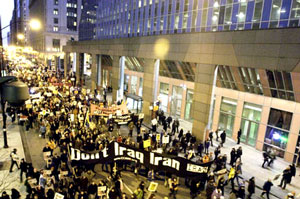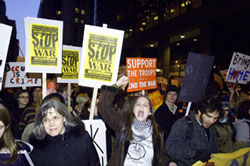ASKIAM and Saeed Shabazz
Staff Writers
Fifth anniversary brings protests, few signs things will soon change
- Iraq’s Sadr calls million-strong march against U.S. occupation (Reuters, 04-03-2008)
- Media, Propaganda and Iraq (GlobalIssues.org, 03-30-2003)

(FinalCall.com) – More than 640 events in hundreds of cities nationwide marked the fifth anniversary of the U.S. invasion and occupation of Iraq, now the second longest war in U.S. history. Nearly three dozen protestors were arrested attempting to block access to the Internal Revenue Service headquarters in Washington, D.C.
“The War Resisters League went to the IRS to put our bodies symbolically between the money that the American taxpayers are giving to the IRS, and the war and bloodshed and destruction that that money is funding in Iraq and elsewhere,” War Resisters League organizer Frida Berrigan told The Final Call.
“We see the IRS as one of the institutions that keeps this war going, even though so many Americans are opposed to the war,” she said.
A CBS poll found 29 percent of respondents felt the loss of American life in Iraq was worth it. The vast majority, 64 percent, said it was not. The war’s cost has ballooned from the Bush administration’s $54 billion to $60 billion projection to Pentagon estimates of $600 billion today. Other experts say long term costs could range from $2 trillion to $4 trillion.
The president is still convinced the war is just and filled with signs of success. President Bush declared March 19 that the troop “surge” had “opened the door to a major strategic victory in the broader war on terror.”
“Removing Saddam Hussein from power was the right decision, and this is a fight that America can and must win,” he said. Questions about the war are understandable, but “our enemies would see an American failure in Iraq as evidence of weakness and lack of resolve,” he said. The United States must stay in Iraq to keep oil supplies and revenue from falling into the hands of al-Qaeda and terrorists, the president argued.

One analyst said the speech Mr. Bush gave could have been the same speech given at the start of the war, and today few Americans believe their president. When the president drove the country to war, many spoke out. A consistent and constant warning about the negative consequences of war has come from the leader of the Nation of Islam. The Honorable Minister Louis Farrakhan, in letters to the president, interviews and speeches, urged America not to go to war. His warnings–that the Bush invasion of Iraq could unite the Muslim world, that the military coalition would fall apart and America would have to go it alone, that the war would bring opposition and conditions unexpected by the United States and that America would be lashed by natural disasters if she continued her warmongering–have largely come true.
In his February address at Saviours’ Day 2008, Min. Farrakhan again referred to the need for America to change her course. “Did you hear Alan Greenspan, the former head of the Federal Reserve, say that the war in Iraq is all about oil? You mean our sons and our daughters are dying and being maimed over America’s junkie spirit toward oil? Did you read that the amount of oil that is under the ground in Iraq is $30 trillion? That is why Republican Presidential candidate John McCain said, ‘We need to stay there about a hundred years. We need to make sure that we get this thing,’” the Minister said.
Will fight for oil?
“Oil was the reason for this war five years ago, it is the reason why we remain entrenched in this war today,” said Antonia Juhasz, author of “The Bush Agenda: Invading the World, One Economy at a Time,” and an activist with Oil Change International.
“Five years after the invasion, the very same oil companies that owned and controlled Iraq’s oil from the end of World War I until nationalization in the early 1970s–Exxon Mobil, Chevron, BP, Shell and Total–are now poised to make their grand return. Each has signed technical service contracts with the Iraqi government for work on five of Iraq’s largest oil fields. These contracts offer a mere foot in the door, however, as both the companies and the Bush administration pressure the Iraqis to pass the Iraq oil law and give the companies the big prize: renewed ownership and control of Iraq’s oil,” she added.
Instead of ushering in an era of stability, critics argue problems in Iraq have contributed to U.S. economic woes, an unstable market and higher prices for petroleum products, including gasoline and home heating oil.
“This morning I awoke to a cold house. Again. This is the second time this winter that my oil dwindled faster than my paycheck accrued. Yes, I do work as much as I am able to, even though I am disabled. The cost of living has risen so fast, that I just can’t keep up with it. My disability covers my rent, and one weeks’ worth of groceries,” wrote Kathy in a posting on the MaineToday.com website.
“I ask you, Mr. Bush, what do I do now? My son is fighting your war in Afghanistan, my father fought in Korea, as did all his brothers, my brother fought in Vietnam, and, until I became disabled, I worked and payed taxes all my life. Enough is Enough,” she said.
No War, No Warming, an anti-war and climate group, has also issued a warning. “If our fossil fuel and war addictions are not urgently addressed and the atmosphere continues to heat up, the world will experience even more conflict,” the group said.
“The U.S. government enables companies like Exxon-Mobil, Halliburton, Blackwater, Bechtel, and others to reap profits off of war and climate change at the expense of the neediest communities,” No War, No Warming said. The top 10 major public oil companies have sold $1.5 trillion worth of crude, pocketing profits of more than $125 billion since the beginning of the Iraq war in 2002, according to the group.
“Spending on Iraq is also a job killer. Every $1 billion spent on a combination of education, healthcare, energy conservation and infrastructure investments creates between 50 and 100 percent more jobs than the same money going to Iraq. Taking the 2007 Iraq budget of $138 billion, this means that upward of 1 million jobs were lost because the Bush Administration chose the Iraq sinkhole over public investment,” observed Robert Pollin and Heidi Garrett-Peltier, in an article published in The Nation. The title of the piece: “The Iraq War Is Killing Our Economy.”

Public demands end to Bush war
From Washington, D.C. to New York City, to San Francisco, after 5 years of anti-war marches, rallies and lobbying, with nearly 4,000 U.S. military personnel dead, thousands of peace activists engaged in some of the most provocative and creative street actions to “restore the Constitution and condemn war profiteers and Congress for buying Bush’s war,” Code Pink Women for Peace said in a statement.
“This is the first time coordinated actions of direct civil disobedience are happening,” said Barbara Benders, communication manager for the Maryland-based group Peace Action. “People who have never done this kind of action are stepping up and deciding now is the time to do it,” she said.
Susan Chenelle, with United For Peace and Justice in New York City, explained to The Final Call that there were arrests at other sites in Washington. “March 19 was an exciting day for the peace movement, and what happened on the streets of D.C. could only be described as vibrant,” Ms. Chenelle said. High school and college students from across the nation came to the capitol over spring break.
“The students realize what the war is costing, and they know that means no jobs and no money for college,” said Ms. Chenelle.
Code Pink staged what it called “Wake Up America,” including a demonstration of waterboarding-torture, in front of the White House. That protest featured a pink, mobile, “Wake Up America” Bed, which Code Pink members took to the offices of what they described as “war profiteers,” to media outlets and to government agencies, “calling attention to the institutions that try to keep America asleep,” the group said. Their props included: Pink pajamas, pink slips and sleeping gear, pillows, bedding, alarm clocks, slippers, coffee mugs accompanying the “Wake Up America” bed.
“We are seeing that Americans are willing to go the distance, skip work and even spend precious time away from their families to deliver the message to the war-profiteers, the federal agencies that have destroyed our constitution and the Congress that we are tired of their support for this war–we want them to work for peace!” said Code Pink Co-founder Jodie Evans.
In Arlington, Texas, there was an “I Stand for Peace” vigil; in Seattle, Wash., non-violent resistance shut down media centers demonstrators said continue cooperation with the Bush regime; in Oklahoma City, Okla., there was a evening vigil entitled “Remembering the Human Cost of War;” Springfield, Ill., activists held an “Interfaith Service for Peace” at the Laurel United Methodist Church and in Lake Worth, Fla., there was a vigil “Five Years of War is Five Years Too Many.”
‘Profiteers’ and political leaders targeted
Hundreds of people across the San Francisco Bay area from all walks of life participated in nonviolent direct actions targeting corporations and government officials profiting from or supporting the war. Demonstrators used sit-ins and blockades of building entrances, targeting the offices of House Speaker Nancy Pelosi and “war profiteering” companies such as Bechtel, Chevron, the Carlyle Group and URS Corp.
“Speaker Pelosi has neglected her election mandate–and the will of the people of San Francisco–to immediately and unequivocally end the war. Her inaction allows San Francisco corporations to continue to reap millions of dollars in profit from the death and devastation in Iraq,” said protest organizer Adrian Wilson. “War machine tours of shame” visited San Francisco corporations. A bike brigade, organized by Bikes not Bombs, cruised the streets in support of the actions.
The Iraq War Moratorium staged a die-in at Sen. Diane Feinstein’s office.
“We are targeting Senator Feinstein because she continues to support the war by voting in favor of supplementary war funding appropriations, and because she chaired the Military Construction Appropriations subcommittee from 2001 through the end of 2005, awarding lucrative contracts to companies owned by her husband, Richard Blum,” explained Bill Simpich, an organizer with Iraq War Moratorium.
Former Georgia congresswoman, Cynthia McKinney and a Green Party candidate for president attended rallies in San Francisco and Los Angeles. “Our country has been hijacked! Condoleezza, Dick and George lied to us and the Congress let them spy on us. The Democrats in Congress choose to spend $720 million every day and make themselves complicit in war crimes against humanity, and crimes against peace,” Ms. McKinney said in a statement.
“Seven-hundred and twenty million dollars a day can feed our hungry children, fund a way home for Katrina survivors, relieve families suffering from predator banks, and pay down on our national debt.”
The demonstrations were an effort to disrupt the business of war as usual, organizers said. Their actions were aimed at the “pillars of war”–the military, war funding, war profiteering, the security state, and the mainstream media.












